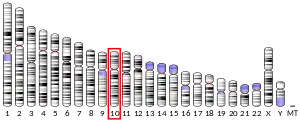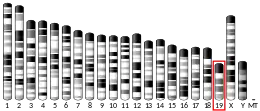| EXOC6 | |||||||||||||||||||||||||||||||||||||||||||||||||||
|---|---|---|---|---|---|---|---|---|---|---|---|---|---|---|---|---|---|---|---|---|---|---|---|---|---|---|---|---|---|---|---|---|---|---|---|---|---|---|---|---|---|---|---|---|---|---|---|---|---|---|---|
| Identifiers | |||||||||||||||||||||||||||||||||||||||||||||||||||
| Aliases | EXOC6, EXOC6A, SEC15, SEC15L, SEC15L1, SEC15L3, Sec15p, exocyst complex component 6 | ||||||||||||||||||||||||||||||||||||||||||||||||||
| External IDs | OMIM: 609672 MGI: 1351611 HomoloGene: 41305 GeneCards: EXOC6 | ||||||||||||||||||||||||||||||||||||||||||||||||||
| |||||||||||||||||||||||||||||||||||||||||||||||||||
| |||||||||||||||||||||||||||||||||||||||||||||||||||
| |||||||||||||||||||||||||||||||||||||||||||||||||||
| |||||||||||||||||||||||||||||||||||||||||||||||||||
| |||||||||||||||||||||||||||||||||||||||||||||||||||
| Wikidata | |||||||||||||||||||||||||||||||||||||||||||||||||||
| |||||||||||||||||||||||||||||||||||||||||||||||||||
Exocyst complex component 6 is a protein that in humans is encoded by the EXOC6 gene.[5]
Function
The protein encoded by this gene is highly similar to the Saccharomyces cerevisiae SEC15 gene product, which is essential for vesicular traffic from the Golgi apparatus to the cell surface in yeast. It is one of the components of a multiprotein complex required for exocytosis. The 5' portion of this gene and two neighboring cytochrome p450 genes are included in a deletion that results in an autosomal dominant form of nonsyndromic optic nerve aplasia (ONA). Alternative splicing and the use of alternative promoters results in multiple transcript variants. A paralogous gene encoding a similar protein is present on chromosome 2.
References
- 1 2 3 GRCh38: Ensembl release 89: ENSG00000138190 - Ensembl, May 2017
- 1 2 3 GRCm38: Ensembl release 89: ENSMUSG00000053799 - Ensembl, May 2017
- ↑ "Human PubMed Reference:". National Center for Biotechnology Information, U.S. National Library of Medicine.
- ↑ "Mouse PubMed Reference:". National Center for Biotechnology Information, U.S. National Library of Medicine.
- ↑ "Entrez Gene: Exocyst complex component 6".
Further reading
- Zhang XM, Ellis S, Sriratana A, Mitchell CA, Rowe T (October 2004). "Sec15 is an effector for the Rab11 GTPase in mammalian cells". The Journal of Biological Chemistry. 279 (41): 43027–34. doi:10.1074/jbc.M402264200. PMID 15292201.
- Grupe A, Li Y, Rowland C, Nowotny P, Hinrichs AL, Smemo S, Kauwe JS, Maxwell TJ, Cherny S, Doil L, Tacey K, van Luchene R, Myers A, Wavrant-De Vrièze F, Kaleem M, Hollingworth P, Jehu L, Foy C, Archer N, Hamilton G, Holmans P, Morris CM, Catanese J, Sninsky J, White TJ, Powell J, Hardy J, O'Donovan M, Lovestone S, Jones L, Morris JC, Thal L, Owen M, Williams J, Goate A (January 2006). "A scan of chromosome 10 identifies a novel locus showing strong association with late-onset Alzheimer disease". American Journal of Human Genetics. 78 (1): 78–88. doi:10.1086/498851. PMC 1380225. PMID 16385451.
- France YE, Boyd C, Coleman J, Novick PJ (March 2006). "The polarity-establishment component Bem1p interacts with the exocyst complex through the Sec15p subunit". Journal of Cell Science. 119 (Pt 5): 876–88. doi:10.1242/jcs.02849. PMID 16478783.
- Rose JE, Behm FM, Drgon T, Johnson C, Uhl GR (2010). "Personalized smoking cessation: interactions between nicotine dose, dependence and quit-success genotype score". Molecular Medicine. 16 (7–8): 247–53. doi:10.2119/molmed.2009.00159. PMC 2896464. PMID 20379614.
- Guichard A, McGillivray SM, Cruz-Moreno B, van Sorge NM, Nizet V, Bier E (October 2010). "Anthrax toxins cooperatively inhibit endocytic recycling by the Rab11/Sec15 exocyst". Nature. 467 (7317): 854–8. Bibcode:2010Natur.467..854G. doi:10.1038/nature09446. PMC 5831355. PMID 20944747.
- Tatonetti NP, Dudley JT, Sagreiya H, Butte AJ, Altman RB (October 2010). "An integrative method for scoring candidate genes from association studies: application to warfarin dosing". BMC Bioinformatics. 11 (Suppl 9): S9. doi:10.1186/1471-2105-11-S9-S9. PMC 2967750. PMID 21044367.
This article incorporates text from the United States National Library of Medicine, which is in the public domain.



